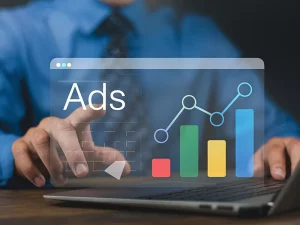Welcome to the digital marketing age, where marketing has taken on a new dimension! Gone are the days of relying solely on traditional advertising methods like billboards and print ads. In today’s fast-paced world, small businesses need to embrace the power of digital marketing to stay relevant and competitive. Whether running a local bakery or an online store, understanding and utilizing digital marketing strategies is essential for your business’s success.
In this blog post, we will demystify the world of digital marketing and explore why it is essential for small businesses in today’s landscape. We’ll delve into its evolution, discuss its numerous benefits, and guide you through choosing the right platforms for your target market. Get ready to unlock the potential of digital marketing as we share must-have strategies that will help your business thrive amidst fierce competition.
So please grab a cup of coffee (or tea!) and dive into this exciting topic together!
The evolution of marketing in the digital age
The world of marketing has witnessed a remarkable transformation with the advent of the digital age. Traditional marketing methods, such as print and TV commercials, have gradually given way to a more targeted and personalized approach. The rise of the internet and social media platforms has revolutionized how businesses connect with their audience.
In the early days of digital marketing, businesses primarily focused on building websites to establish an online presence. However, as technology advanced and consumer behavior shifted, new avenues opened for reaching customers more effectively. Email marketing became popular, allowing businesses to communicate with their customers through personalized messages directly.
Then came search engine optimization (SEO), which allowed businesses to optimize their websites so they could be easily found by potential customers searching for relevant keywords. This was followed by pay-per-click advertising (PPC), where businesses could place ads on search engines and only pay when someone clicked on their ad.
Social media soon took center stage in the digital marketing landscape. Platforms like Facebook, Instagram, Twitter, and LinkedIn provide unparalleled opportunities for businesses to personally engage with their target market. Through content creation strategies like blogging and video production, brands began telling stories that resonated with consumers’ emotions.
Influencer marketing has become increasingly prevalent as individuals gain immense influence through social media channels. Businesses collaborate with these influencers to promote products or services authentically within specific niche communities.
As we move forward into an interconnected future driven by artificial intelligence (AI) and virtual reality (VR), small businesses must stay updated with evolving trends in digital marketing. Adapting strategies that align with emerging technologies will enable them to survive and thrive in this ever-changing landscape.
Benefits of digital marketing for small businesses
In today’s digital age, small businesses have a tremendous opportunity to level the playing field with larger competitors through effective digital marketing strategies. Here are some key benefits that make it essential for small businesses to embrace digital marketing:
1. Increased Online Visibility: With billions of people using the internet daily, digital marketing allows small businesses to reach a wider audience and increase their online visibility. This can increase website traffic, brand awareness, and potential customers.
2. Cost-Effective Advertising: Compared to traditional forms of advertising like print or TV ads, digital marketing offers cost-effective options such as social media advertising and pay-per-click campaigns. Small businesses with limited budgets can maximize their advertising efforts without breaking the bank.
3. Targeted Audience Reach: One of the greatest advantages of digital marketing is its ability to target specific audiences based on demographics, interests, and behavior patterns. By understanding your target market and utilizing platforms like Google Ads or Facebook Ads, you can ensure that your message reaches those most likely to be interested in your products or services.
4. Measurable Results: Unlike traditional forms of marketing, where it isn’t easy to track success metrics accurately, digital marketing provides valuable data analytics tools that enable you to measure campaign performance in real-time. This lets you make data-driven decisions about which strategies work best for your business.
5. Improved Customer Engagement: Digital channels provide numerous opportunities for small businesses to engage directly with their customers through social media interactions, personalized email newsletters, and chatbots.
Understanding your target market and choosing the right digital platforms
Understanding your target market is crucial for the success of any business, and it becomes even more important in the digital marketing landscape. With so many platforms and channels available, deciding which ones are best suited for your small business can be overwhelming.
To begin with, you need to identify who your ideal customers are. What demographics do they belong to? What are their interests and preferences? By understanding these aspects, you can tailor your digital marketing efforts to reach them effectively.
Once you have a clear picture of your target market, it’s time to choose the right digital platforms. Start by researching where your audience spends most of their time online. Are they active on social media? Do they prefer search engines or email newsletters?
Consider using multiple channels that align with your target market’s preferences. For instance, platforms like Instagram and TikTok might work well for visual content if you’re targeting younger audiences. On the other hand, if professionals are your main audience, LinkedIn could be a valuable platform for networking and sharing industry insights.
Remember that different platforms offer unique opportunities for engagement and interaction with potential customers. Pay attention to features like advertising options, analytics capabilities, and user demographics when selecting the best fit for your business.
By understanding your target market and choosing the right digital platforms accordingly, you can maximize the impact of your marketing efforts while minimizing costs and resources wasted on ineffective strategies.
Must-have digital marketing strategies for small businesses
In today’s digital era, having an effective online presence is crucial for the success of small businesses. With millions of potential customers just a click away, it’s important to implement the right strategies to stand out from the competition and reach your target audience. Here are some must-have digital marketing strategies to help small businesses thrive online.
1. Search Engine Optimization (SEO): SEO is vital in improving your website’s visibility on search engines like Google. By optimizing your website with relevant keywords and high-quality content, you can increase organic traffic and attract potential customers.
2. Social Media Marketing: Social media platforms provide an excellent opportunity to directly connect with your target market. Create engaging content, interact with followers, and leverage paid advertising options to expand your reach.
3. Content Marketing: Producing valuable and informative content establishes you as an industry expert and helps drive traffic to your website through search engines and social media shares.
4. Email Marketing: Building an email list allows you to stay connected with customers who have shown interest in your products or services. Send regular newsletters, promotional offers, or personalized recommendations to nurture relationships and encourage repeat business.
5. Pay-Per-Click Advertising (PPC): PPC campaigns help drive instant traffic to your website by placing ads at the top of search engine results pages or on relevant websites across various networks such as Google AdWords or Facebook Ads.
6. Influencer Marketing: Collaborating with influencers in your industry can expose your brand to their loyal followers while gaining credibility among a targeted audience.
7. Mobile Optimization: With mobile usage surpassing desktops, small businesses need to optimize their websites for mobile devices, ensuring a seamless user experience regardless of screen size.
By implementing these must-have digital marketing strategies tailored specifically for small businesses, you’ll be able to effectively navigate the vast online marketplace and establish a strong online presence. Remember, consistency and continuous monitoring of your marketing efforts are key.
Measuring success and making adjustments
Measuring the success of your digital marketing efforts is crucial for small businesses. You need to track and analyze data to know if your strategies are effective or need adjustments. So, how can you measure success and make necessary adjustments in your digital marketing campaigns?
Set clear goals and key performance indicators (KPIs) aligning with your business objectives. These include increasing website traffic, improving conversion rates, or boosting social media engagement.
Next, utilize analytics tools to track important metrics such as website traffic sources, visitor behavior on your site, click-through rates on ads, and social media impressions. This data will provide insights into what works well and what needs improvement.
Regularly review these metrics to identify trends and patterns over time. Look for areas where you’re excelling and those that require attention. For instance, if a particular advertising channel isn’t driving significant results despite considerable investment, it may be wise to reallocate resources elsewhere.
Experiment with different strategies and monitor their impact on the desired outcomes. A/B testing can help determine which content variations or design elements perform better with your target audience.
In addition to quantitative data analysis, listen to customer feedback through surveys or reviews to gain qualitative insights about their experience with your brand online.
Successful digital marketing requires ongoing adjustment based on changing consumer behaviors and market dynamics. Stay up-to-date with industry trends and constantly adapt your strategies accordingly.
By measuring success regularly and making adjustments as needed in response to the collected data-driven insights from various channels—website analytics software like Google Analytics—you’ll optimize your digital marketing efforts for maximum effectiveness.
Common misconceptions about digital marketing and how to overcome them
Digital marketing can be a game-changer for small businesses, but unfortunately, some common misconceptions may hold them back from fully embracing this powerful tool. Let’s debunk these myths and discover how to overcome them.
Misconception 1: Digital marketing is only for big businesses.
Fact: This couldn’t be further from the truth! Digital marketing is even more crucial for small businesses as it levels the playing field and allows them to compete with larger competitors. Small businesses can effectively reach their target audience with targeted strategies and cost-effective tactics.
Misconception 2: It needs to be simplified and more time-consuming.
Fact: While digital marketing may initially seem overwhelming, numerous resources are available to simplify the process. Small business owners can start by focusing on key platforms that align with their target market. Additionally, outsourcing certain tasks or hiring experts in digital marketing can save time and ensure effective implementation.
Misconception 3: It requires a large budget.
Fact: One of the greatest advantages of digital marketing is its scalability. Small businesses can start with a modest budget and gradually increase investments based on results. Social media platforms offer affordable advertising options, while content creation through blogging or video production can be done in-house without significant costs.
Misconception 4: Results are not measurable.
Fact: On the contrary, one of the biggest strengths of digital marketing lies in its ability to track and measure results accurately. With tools like Google Analytics or social media insights, small business owners have access to valuable data that helps them understand what works best for their audience. This data-driven approach allows for continuous optimization of campaigns.
Overcoming these misconceptions is essential for small businesses looking to thrive in today’s competitive landscape. By understanding the benefits of digital marketing, dispelling myths surrounding complexity or costliness, and leveraging analytics tools – small businesses can harness the power of digital marketing to boost their growth and reach new.
Conclusion: Embracing digital marketing for business growth
In today’s digital age, small businesses need to leverage the power of digital marketing. With the evolution of technology and consumer behavior, more than traditional marketing methods are required to reach and engage with your target audience effectively.
By embracing digital marketing strategies, small businesses can level the playing field and compete with larger corporations. The benefits are numerous – from cost-effectiveness and increased brand visibility to targeted advertising and measurable results.
Understanding your target market is crucial when choosing the right digital platforms to focus on. Whether it’s social media platforms like Facebook or Instagram, search engines like Google, or email marketing campaigns, knowing where your audience spends their time online will maximize your efforts.
Implementing must-have digital marketing strategies such as search engine optimization (SEO), content creation, social media management, email marketing campaigns, and paid advertising will help you establish a strong online presence and connect with potential customers.
Measuring success is another critical aspect of any effective digital marketing strategy. Analyzing key performance indicators (KPIs) such as website traffic, conversion rates, engagement metrics, and return on investment (ROI) allows you to make data-driven decisions that optimize future campaigns.
Despite its proven effectiveness in driving business growth, common misconceptions about digital marketing may discourage some small business owners from fully embracing it. Overcoming these misconceptions starts with educating yourself about its potential benefits by seeking reliable sources of information or consulting with professionals in the field.
In conclusion, Small businesses must recognize the power of digital marketing in today’s competitive landscape. Understanding their target market and implementing effective strategies tailored towards reaching them through various online channels can lead to significant growth opportunities. Embrace this evolving form of marketing now so that your business can thrive in an increasingly digitized world!






